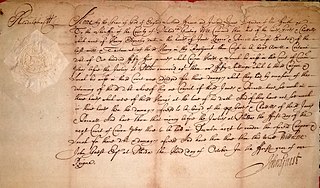Habeas corpus is a recourse in law through which a person can report an unlawful detention or imprisonment to a court and request that the court order the custodian of the person, usually a prison official, to bring the prisoner to court, to determine whether the detention is lawful.
Marbury v. Madison, 5 U.S. 137 (1803), was a landmark U.S. Supreme Court case that established the principle of judicial review in the United States, meaning that American courts have the power to strike down laws and statutes that they find to violate the Constitution of the United States. Decided in 1803, Marbury is regarded as the single most important decision in American constitutional law. The Court's landmark decision established that the U.S. Constitution is actual law, not just a statement of political principles and ideals, and helped define the boundary between the constitutionally separate executive and judicial branches of the federal government.
Equity is a particular body of law that was developed in the English Court of Chancery. It exists in domestic law, both in civil law and in common law systems, and in international law. The tradition of equity begins in antiquity with the writings of Aristotle (epieikeia) and with Roman law (aequitas). Later, in civil law systems, equity was integrated in the legal rules, while in common law systems it became an independent body of law.

John Thomas Sladek was an American science fiction author, known for his satirical and surreal novels.

Ex parte Merryman, 17 F. Cas. 144 (No. 9487), is a well-known and controversial U.S. federal court case that arose out of the American Civil War. It was a test of the authority of the President to suspend "the privilege of the writ of habeas corpus" under the Constitution's Suspension Clause, when Congress was in recess and therefore unavailable to do so itself. More generally, the case raised questions about the ability of the executive branch to decline enforcement of judicial decisions when the executive believes them to be erroneous and harmful to its own legal powers.
In law, certiorari is a court process to seek judicial review of a decision of a lower court or government agency. Certiorari comes from the name of an English prerogative writ, issued by a superior court to direct that the record of the lower court be sent to the superior court for review. The term is Latin for "to be made certain", and comes from the opening line of such writs, which traditionally began with the Latin words "Certiorari volumus...".

In common law, a writ is a formal written order issued by a body with administrative or judicial jurisdiction; in modern usage, this body is generally a court. Warrants, prerogative writs, subpoenas, and Certiorari are common types of writ, but many forms exist and have existed.
A writ of assistance is a written order issued by a court instructing a law enforcement official, such as a sheriff or a tax collector, to perform a certain task. Historically, several types of writs have been called "writs of assistance". Most often, a writ of assistance is "used to enforce an order for the possession of lands". When used to evict someone from real property, such a writ is also called a writ of restitution or a writ of possession. In the area of customs, writs of assistance were a product of enactments of the British Parliament beginning with the Customs Act of 1660 though the first mention of the phrase was in the follow-up Customs Act of 1662. The writs of assistance were issued by the Court of Exchequer to help customs officials search for smuggled goods. These writs were called "writs of assistance" because they called upon sheriffs, other officials, and loyal subjects to "assist" the customs official in carrying out his duties.
The hereditary peers form part of the peerage in the United Kingdom. As of November 2021, there are 809 hereditary peers: 30 dukes, 34 marquesses, 191 earls, 111 viscounts, and 443 barons.

The Habeas Corpus Act 1679 is an Act of Parliament in England during the reign of King Charles II. It was passed by what became known as the Habeas Corpus Parliament to define and strengthen the ancient prerogative writ of habeas corpus, which required a court to examine the lawfulness of a prisoner's detention and thus prevent unlawful or arbitrary imprisonment.

Henry of Bracton, also Henry de Bracton, also Henricus Bracton, or Henry Bratton also Henry Bretton was an English cleric and jurist.
Grimketel was an English clergyman who went to Norway as a missionary and was partly responsible for the conversion of Norway to Christianity. He initiated the beatification of Saint Olaf. On his return to England he became Bishop of Selsey and also for a time Bishop of Elmham. He was accused, by some, of being guilty of simony.
Auxilium ad filium militem faciendum et filiam maritandam was an ancient writ directed to the sheriff of every county in England, where the king or other lord had any tenants, to levy of them reasonable aid, towards the knighting of his son, and the marriage of his eldest daughter.
In archaic English law, a cape was a judicial writ concerning a plea of lands and tenements; so called, as most writs are, from the word which carried the chief intention of the writ.
A chartis reddendis was an ancient writ, which lays against one who had charters of feoffment entrusted to his keeping, and who refused to deliver them to the owner.

Reynato Puno y Serrano, KGCR is a Filipino jurist. He served as the 22nd Chief Justice of the Supreme Court of the Philippines from December 8, 2006 by President Gloria Macapagal Arroyo until his mandatory retirement on May 17, 2010. Puno had initially been appointed to the Supreme Court as an Associate Justice on June 28, 1993.
In United States law, habeas corpus is a recourse challenging the reasons or conditions of a person's confinement under color of law. A petition for habeas corpus is filed with a court that has jurisdiction over the custodian, and if granted, a writ is issued directing the custodian to bring the confined person before the court for examination into those reasons or conditions. The Suspension Clause of the United States Constitution specifically included the English common law procedure in Article One, Section 9, clause 2, which demands that "The privilege of the writ of habeas corpus shall not be suspended, unless when in cases of rebellion or invasion the public safety may require it."

David Kenneth Harbour is an American actor. He gained recognition for his portrayal of Jim Hopper in the Netflix science fiction drama series Stranger Things (2016–present), for which he earned a Critics' Choice Television Award in 2018. For the role, he also received two Primetime Emmy Award nominations and a Golden Globe Award nomination.
In most legal systems of the Spanish-speaking world, the writ of amparo is a remedy for the protection of constitutional rights, found in certain jurisdictions. The amparo remedy or action is an effective and inexpensive instrument for the protection of individual rights.
A parliamentary by-election occurs in the United Kingdom following a vacancy arising in the House of Commons. They are often seen as a test of the rival political parties' fortunes between general elections.






